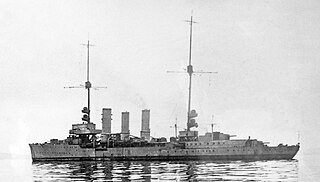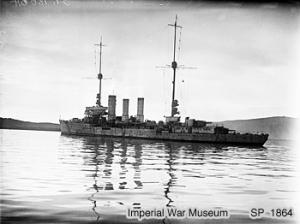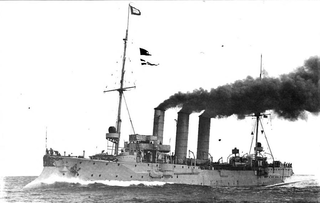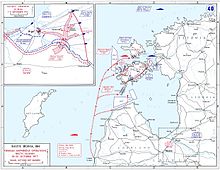
SMS Pillau was a light cruiser of the Imperial German Navy. The ship, originally ordered in 1913 by the Russian navy under the name Maraviev Amurskyy, was launched in April 1914 at the Schichau-Werke shipyard in Danzig. However, due to the outbreak of World War I in August 1914, the incomplete ship was confiscated by Germany and renamed SMS Pillau for the East Prussian port of Pillau. Pillau was commissioned into the German Navy in December 1914. She was armed with a main battery of eight 15 cm SK L/45 (5.9-inch) guns and had a top speed of 27.5 kn. One sister ship was built, Elbing.

SMS Cöln was a light cruiser in the German Kaiserliche Marine, the second to bear this name, after her predecessor SMS Cöln had been lost in the Battle of Heligoland Bight. Cöln, first of her class, was launched on 5 October 1916 at Blohm & Voss in Hamburg and completed over a year later in January 1918. She and her sister Dresden were the last two light cruisers built by the Kaiserliche Marine; eight of her sisters were scrapped before they could be completed. The ships were an incremental improvement over the preceding Königsberg-class cruisers.

SMS Frankfurt was a light cruiser of the Wiesbaden class built by the German Kaiserliche Marine. She had one sister ship, SMS Wiesbaden; the ships were very similar to the previous Karlsruhe-class cruisers. The ship was laid down in 1913, launched in March 1915, and completed by August 1915. Armed with eight 15 cm SK L/45 guns, Frankfurt had a top speed of 27.5 knots and displaced 6,601 t at full load.

SMS Stralsund was a Magdeburg-class light cruiser of the German Kaiserliche Marine. Her class included three other ships: Magdeburg, Breslau, and Strassburg. She was built at the AG Weser shipyard in Bremen from 1910 to December 1912, when she was commissioned into the High Seas Fleet. The ship was armed with a main battery of twelve 10.5 cm SK L/45 guns and had a top speed of 27.5 knots.

SMS Strassburg was a light cruiser of the Magdeburg class in the German Kaiserliche Marine. Her class included three other ships: Magdeburg, Breslau, and Stralsund. Strassburg was built at the Kaiserliche Werft shipyard in Wilhelmshaven from 1910 to October 1912, when she was commissioned into the High Seas Fleet. The ship was armed with a main battery of twelve 10.5 cm (4.1 in) SK L/45 guns and had a top speed of 27.5 knots.

SMS Prinz Adalbert was an armored cruiser built in the early 1900s for the Imperial German Navy. She was named after Prince Adalbert of Prussia, former Commander-in-Chief of the Prussian Navy, and was the lead ship of her class.

SMS Prinz Heinrich was a unique German armored cruiser built at the turn of the 20th century for the German Kaiserliche Marine, named after Kaiser Wilhelm II's younger brother Prince Heinrich. The second vessel of that type built in Germany, Prinz Heinrich was constructed at the Kaiserliche Werft in Kiel, being laid down in December 1898, launched in March 1900, and commissioned in March 1902. Prinz Heinrich's design was a modification of the previous armored cruiser, Fürst Bismarck, and traded a smaller main battery and thinner armor for higher speed. All subsequent German armored cruisers were incremental developments of Prinz Heinrich.

SMS Königsberg was the lead ship of the Königsberg class of light cruisers, built for the German Kaiserliche Marine during World War I. She took the name of the earlier Königsberg, which had been destroyed during the Battle of Rufiji Delta in 1915. The new ship was laid down in 1914 at the AG Weser shipyard, launched in December 1915, and commissioned into the High Seas Fleet in August 1916. Armed with eight 15 cm SK L/45 guns, the ship had a top speed of 27.5 kn.

SMS Nürnberg was a Königsberg-class light cruiser built during World War I by Germany for the Imperial Navy. She had three sisters: Königsberg, Karlsruhe, and Emden. The ship was named after the previous light cruiser Nürnberg, which had been sunk at the Battle of the Falkland Islands. The new cruiser was laid down in 1915 at the AG Weser shipyard in Bremen, launched in April 1916, and commissioned into the High Seas Fleet in February 1917. Armed with eight 15 cm (5.9 in) SK L/45 guns, the ship had a top speed of 27.5 kn.

SMS Emden was a German light cruiser belonging to the Königsberg class, built during the First World War. Emden served in the German Kaiserliche Marine until the end of the war, at which point she was ceded to France. The ship was named after the previous Emden, which had been destroyed at the Battle of Cocos earlier in the war. She mounted an Iron Cross on her stem-head in honor of the earlier Emden. The new cruiser was laid down in 1914 at the AG Weser shipyard in Bremen, launched in February 1916, and commissioned into the High Seas Fleet in December 1916. Armed with eight 15 cm SK L/45 guns, the ship had a top speed of 27.5 kn.

SMS Graudenz was the lead ship of her class of light cruisers. She had one sister ship, SMS Regensburg. The ship was built by the German Kaiserliche Marine in the Kaiserliche Werft shipyard in Kiel, laid down in 1912 and commissioned into the High Seas Fleet in August 1914, days after the outbreak of World War I. She was named for the then-German town of Graudenz. The ship was armed with a main battery of twelve 10.5 cm SK L/45 guns and had a top speed of 27.5 knots.

SMS Brummer was a minelaying light cruiser of the German Kaiserliche Marine; she was the lead ship of her class. Her sister ship was Bremse. Brummer was laid down at AG Vulcan's shipyard in Stettin, Germany on 24 April 1915 and launched on 11 December 1915 and completed on 2 April 1916. Armed with a main battery of four 15-centimeter (5.9 in) guns in single mounts, she carried 400 mines.

SMS Bremse was a Brummer-class minelaying light cruiser of the German Kaiserliche Marine. She was laid down by AG Vulcan Stettin on 27 April 1915 and launched on 11 March 1916 at Stettin, Germany, the second of the two-ship class after her sister, SMS Brummer. She served during the First World War, operating most of the time in company with her sister. The two ships took part in an ambush on a convoy in the North Sea, where they sank two destroyers in a surprise attack, before hunting down and sinking nine merchantmen, after which they returned to port unscathed.

SMS Regensburg was a light cruiser of the Graudenz class built by the German Kaiserliche Marine. She had one sister ship, SMS Graudenz. The ship was built by the AG Weser shipyard in Bremen, laid down in 1912, launched in April 1914, and commissioned into active service in January 1915. She was named for the German town of Regensburg. The ship was armed with a main battery of twelve 10.5 cm SK L/45 guns and had a top speed of 27.5 knots, though in 1917 she was rearmed with seven 15 cm SK L/45 guns.

SMS Kolberg was a light cruiser of the German Kaiserliche Marine during the First World War, the lead ship of her class. She had three sister ships, SMS Mainz, Cöln, and Augsburg. She was built by the Schichau-Werke; her hull was laid down in early 1908 and she was launched later that year, in November. She was commissioned into the High Seas Fleet in June 1910. She was armed with a main battery of twelve 10.5 cm SK L/45 guns and had a top speed of 25.5 kn.

SMS Danzig was a light cruiser of the Imperial German Navy. Named for the city of Danzig, she was the seventh and last ship of the Bremen class. She was begun by the Imperial Dockyard in her namesake city in 1904, launched on 23 September 1905 and commissioned on 1 December 1907. Armed with a main battery of ten 10.5 cm (4.1 in) guns and two 45 cm (18 in) torpedo tubes, Danzig was capable of a top speed of 22 knots.

SMS Hamburg was the second member of the seven-vessel Bremen class of light cruisers, built for the German Kaiserliche Marine in the early 1900s. She and her sister ships were ordered under the 1898 Naval Law that required new cruisers be built to replace obsolete vessels in the fleet. The design for the Bremen class was derived from the preceding Gazelle class, utilizing a larger hull that allowed for additional boilers that increased speed. Named for the city of Hamburg, the ship was armed with a main battery of ten 10.5 cm (4.1 in) guns and had a top speed of 22 knots.

SMS Augsburg was a Kolberg-class light cruiser of the German Kaiserliche Marine during the First World War. She had three sister ships, SMS Kolberg, Mainz, and Cöln. The ship was built by the Kaiserliche Werft in Kiel; her hull was laid down in 1908 and she was launched in July 1909. Augsburg was commissioned into the High Seas Fleet in October 1910. She was armed with a main battery of twelve 10.5 cm SK L/45 guns and had a top speed of 25.5 knots.

SMS Lübeck was the fourth of seven Bremen-class cruisers of the Imperial German Navy, named after the city of Lübeck. She was begun by AG Vulcan Stettin in Stettin in 1903, launched in March 1904 and commissioned in April 1905. Armed with a main battery of ten 10.5 cm (4.1 in) guns and two 45 cm (18 in) torpedo tubes, Lübeck was capable of a top speed of 22.5 knots.
SMS Stuttgart was a Königsberg-class light cruiser of the Kaiserliche Marine, named after the city of Stuttgart. She had three sister ships: Königsberg, Nürnberg, and Stettin. Stuttgart was laid down at the Imperial Dockyard in Danzig in 1905, launched in September 1906, and commissioned in February 1908. Like her sisters, Stettin was armed with a main battery of ten 10.5 cm (4.1 in) guns and a pair of 45 cm (18 in) torpedo tubes, and was capable of a top speed in excess of 25 knots.



















